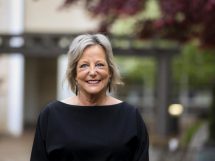HIGHLAND HEIGHTS, Ky. (Aug. 31, 2012) — Northern Kentucky University has received a $600,000 National Science Foundation Scholarships in Science, Technology, Engineering and Mathematics (STEM) grant to establish a program that seeks to recruit, retain and graduate financially needy, academically talented students who will enter the graduate school or the workforce in a STEM discipline.
The program, called Project SOAR, is a collaboration that involves five NKU academic departments – biological sciences, chemistry, physics and geology, mathematics and statistics, and computer science. It will award a four-year scholarship to 17 incoming freshmen in each of four years (68 total full scholarships). The first two years are paid from grant funds and the last two will be paid by the university.
Gail Mackin, a professor in the NKU Department of Mathematics and Statistics, is the principal investigator for the grant. She said Project SOAR is about more than just educating students. “This under-tapped pool of talented students has the potential to meet the expected local and national need for highly skilled scientists and technically trained employees,” she said. “In addition, they serve as role models to other underrepresented students who may be interested in the STEM disciplines.”
This is the second NSF scholarship grant received by NKU. In 2010, NKU received a five-year grant of nearly $1 million to recruit and retain STEM students. Through that program, the university currently enrolls 60 scholars.
Project SOAR is based on the 2010 program and extensive literature on best practices for increasing retention and graduation rates for low-income, first-generation students. The key elements of the rigorous program include faculty mentors; a year-long freshman seminar; STEM learning communities; a STEM-living community; high-quality enrichment activities; opportunities for research, internships and co-ops; entrepreneurship training; and academic support services including peer mentoring and tutoring.
Mackin noted that SOAR scholars tend to face more barriers to graduation than other students. She said they are likely to have limited access to information about the college experience; they may lack knowledge of the campus environment and its academic expectations and bureaucratic operations; they likely lack time and stress management skills necessary for success; they may have limited social connections essential for developing support networks; and they likely receive less support from their families.
In addition to increasing the participation of under-represented groups in the STEM disciplines, the project will contribute to the region’s goal of increasing the number of graduates prepared for jobs in professional, scientific and technical areas. It will also produce data that can be applied institution-wide to recruitment practices, design of first-year courses, use of discipline-specific learning communities, and enrichment and academic support services. This critical data will also be shared statewide and nationally.





















Add Comment